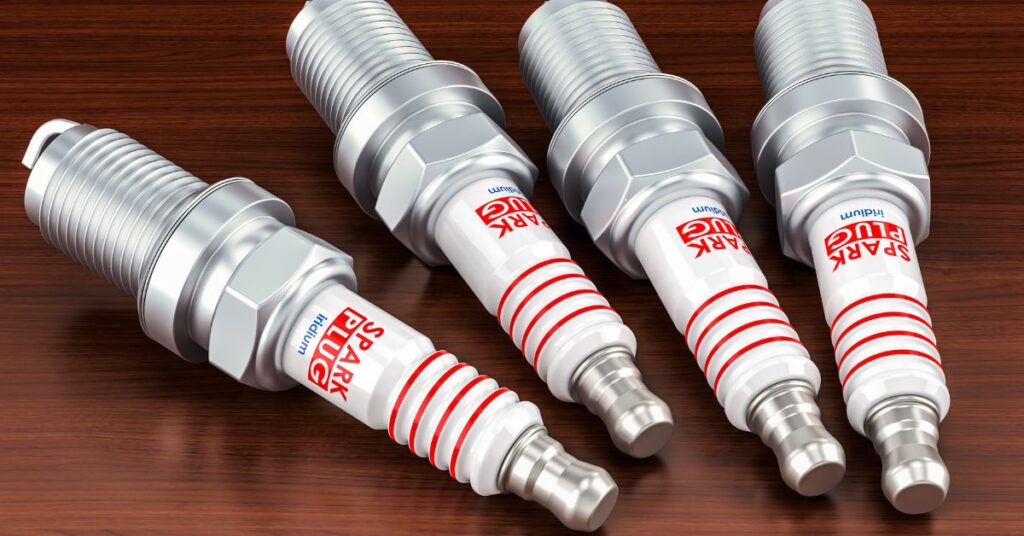
Table of Contents
Spark plugs are essential for engine performance and come in three primary types: copper, platinum, and iridium. Platinum and iridium are also available in double variants, which we will discuss later. Installing the correct spark plug is essential based on your type of vehicle and should be based on your engine’s specific design. Copper plugs, known for their high conductivity, are more affordable but have a shorter lifespan. Platinum and iridium plugs, though more costly, offer greater durability.
It’s best to adhere to your vehicle’s manual for the recommended spark plug type for optimal performance. If you’re uncertain what type of spark plug you need, the ASE-certified technicians at McCullough NAPA Auto Care are happy to assist you.
What Does A Spark Plug Do?
The spark plug is a fundamental component of an internal combustion engine. Its primary function is to ignite the air-fuel mixture within the engine’s combustion chamber. This ignition is achieved by generating an electrical spark between the spark plug’s electrodes – the center electrode and the side electrode. The ignition system supplies the energy for this spark. By igniting the air-fuel mixture precisely, spark plugs facilitate efficient combustion, essential for the engine’s power generation and overall performance. They are critical in ensuring smooth engine operation, fuel efficiency, and emission control.
Understanding different types of spark plugs involves knowing their structure and materials. A typical spark plug features a top section with a ceramic and metal terminal for connection and a copper core with a central electrode. The body includes a threaded part for installation into the engine’s cylinder head and a side electrode. The gap between the side and center electrodes is where the spark occurs. Variations in spark plugs mainly lie in the electrode material. Adhering to the manufacturer’s recommendations for spark plugs is crucial for optimal vehicle performance.
Different Types of Spark Plugs
1 – Copper Spark Plugs
Copper spark plugs have been a staple in automotive history for over a century. They feature a solid copper core and a nickel alloy electrode. Due to nickel’s softer nature than platinum or iridium, these plugs have a shorter lifespan. They are often preferred for older vehicles with low-voltage systems. However, their high conductivity also makes them a choice for some high-performance vehicles. Despite advancements in spark plug technology, copper plugs remain relevant for specific engine types and performance requirements.
2 – Platinum Spark Plugs
Platinum is harder than nickel and offers greater longevity, aligning with the automotive industry’s push towards components that last 80-100K miles. Platinum spark plugs feature a platinum disc welded to the center electrode, providing longer life and better edge retention, thus ensuring improved conductivity. Platinum spark plugs also run hotter, minimizing fouling and deposit buildup. Platinum spark plugs are commonly used in modern vehicles with advanced ignition systems, such as those with coil-on-plug (COP), distributor-less ignition systems (DIS), or coil pack configurations, including a range of late-model cars, some high-performance vehicles, and specific luxury models.
3 – Double Platinum Spark Plugs
In the early 1990s, DIS (Distributorless Ignition Systems) introduced “wasted spark” ignition systems. These systems feature one coil pack firing two spark plugs simultaneously – one during the compression stroke and the other during the exhaust stroke. The key innovation here is the alternating polarity between the spark plugs connected to each coil, leading to different wear patterns on the electrodes. This development necessitated the creation of double-platinum spark plugs featuring platinum on both the center and side electrodes, enhancing durability in DIS systems and extending their lifespan to about 80-100K miles. It’s crucial to use double platinum plugs if your vehicle’s manual recommends it, as single platinum plugs may wear prematurely in these systems.
4 – Iridium Spark Plugs
Iridium spark plugs, introduced in the mid-2000s, are designed for modern coil-on-plug ignition systems. They typically feature a smaller diameter center electrode, enhancing efficiency by reducing the voltage required to generate a spark. Iridium’s durability allows it to perform under extreme conditions. For vehicles where iridium spark plugs are recommended, it’s advisable to follow this guidance despite the higher cost, as they offer optimal performance and longevity.
5 – Double Iridium Spark Plugs
Contact McCullough NAPA Auto Care For Spark Plug Replacement
For expert spark plug replacement and advice on the best choice for your vehicle, reach out to McCullough NAPA Auto Care. Our team of ASE-certified technicians is equipped to handle all your spark plug needs, ensuring your vehicle runs smoothly under any condition. Whether it’s upgrading to high-performance plugs or regular maintenance, we’ve got you covered. Contact us today for top-quality service and to keep your vehicle performing at its best.

